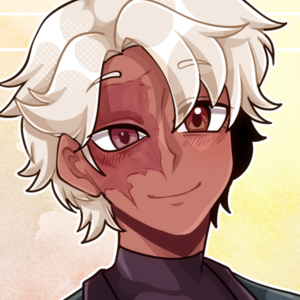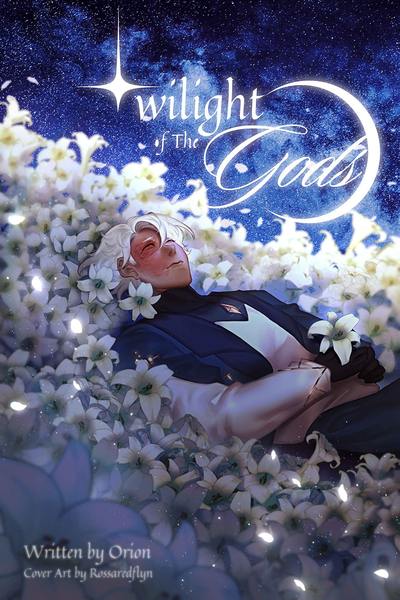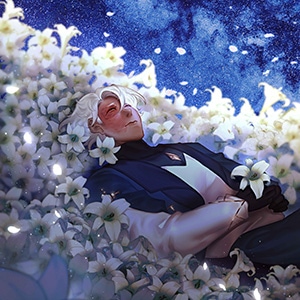A pair of maidservants happened to pass him while he was making his way down the hall, mired in flippant gossip as they went about their rounds. Albeit it was hardly your typical scuttlebutt appertaining to harmless scandals and flights of fancy. The conversation topic in question was one he ordinarily went through hoops after hoops to circumvent but alas, to do so would be like avoiding the need to breathe.
“Codoslia certainly has put up more of a fight than we’ve anticipated, but they are also being unduly stubborn. I mean, they already lack sufficient military strength to sustain a formal opposition against us in the first place... forbidden magics or not, we already have them backed into a corner... the real question is whether those egotists in the College is going to take that humiliation lying down, but it has been mostly radio static on their end.”
“At this point, they must have already exhausted their avenues,” the other maid suspected. “If this goes on any longer, and College continues to act neutral while the king arms their civilians and drains their materiel, it will be the end of their kingdom as they know it... it’s almost a bit heartbreaking when you look at it from the perspective of their residents... the lower classes are already forced to have to endure the maltreatment they receive at the hands of the nobility, and now they have all been but abandoned by them.”
“I don't know if it's pure stubbornness or just sheer stupidity. The College must feel pressured... it wouldn’t surprise me if they simply decided to drag the rest of the country down with them. But... regardless, it isn’t looking good for them... especially with His Royal Highness on the battlefield, doom is all that awaits them.”
... His Royal Highness.
Allegedly, the Crown Prince— Roximus Avraham Montague— was less of a soldier and more so a ruthless cyclone that was dead set on terminating everything that dared to obstruct his warpath— an unavoidable death knell. The fate of their paltry resistance might have been sealed the instant his burning grudge convinced him to join his subjects on the frontlines personally.
Codoslia used to be a tyrant in its own right. At its genesis, it was the opposite of the “meek,” unpresuming power that it is today. But due to its insubstantial military funding, it was ultimately doomed to fall behind as it were when juxtaposed to its easterly neighbor. The Codoslian people— ambitious was a good way to describe them as dyed-in-the-wool intellectuals, pioneers of the sorcerous arts. and indisputable masters of their craft.
Although the people of Codoslia were mostly pacifistic, that truly only applied to the common people. Scholars, physicians, and bona fide connoisseurs of progression and science spanned the bulk of their talents while having claimed themselves to be above notions of violence. Albeit due to the people’s disinclination toward warfare, with global mandates on magic severely curbing the limits of their potential, they were susceptible to numerous invasions, many of which were coordinated by Igerene’s own greed throughout the years, which left this once grand nation but a shadow of its former influence.
Codoslia’s government was overseen by the Council of Sages, who in turn took direct orders from an elected Grandmaster, and both bodies were intrinsically interconnected with the College of Alchemy— a learning institution devoted to the edification and cultivation of magic notwithstanding its widespread infamy and borderline taboo nature, it was nonetheless looked to as a benchmark of unequaled genius that in turn fostered some of the most reputable intelligentsia of the current era.
However, many cite that the College has been at the forefront of the class issues that have more or less placed Codoslian society on the road to total upheaval even before they found themselves tangled up in this ruinous conspiracy that preyed on their long-held, deep-rooted contempt for Igerene... and vice versa.
Igerene provided the necessary protection for Codoslia who, and many would peg the sages of the College as underhanded as an unscrupulous strategist who only ever incurred the dirtiest of tactics— would withhold important resources not found in the eastern continent, so much so that Igerene had no choice but to provide their sworn aid in exchange for survival. Both parties benefited from this arrangement and have appropriately performed throughout the course of many a year now to meet the other’s demands despite their barely concealed aversion to concord... But naturally, that was no longer the case.
Moreover, the Kingdom of Igerene had contrastively humbler beginnings: it was a pitiful fledgling of a country that was beset by infertility, desolation, and unending fighting. It was mandated by avaricious suzerains who mistreated and exploited the common people for their own convenience. Under their rule, it had become a nexus of brutal serfdom and unjustness. Although many uprisings have occurred before, it was ultimately a young farmgirl who managed to overthrow their oppressors and bring light to their dying land by marshaling the victimized working class under a bloody flag of revolution.
It had been nothing short of a miracle, the people say. How a single audacious woman— a child, no less— was responsible for completely overhauling the status quo within the nation, transforming it from an insignificant speck of land— a hub of exploitation, grief, and rampant famine— into one of the most powerful and feared empires the world has ever seen.
And she would become the first ruler of this newly established superpower: Emperor Drucilla, otherwise known by her much-feared moniker, Drucilla the Conqueror— and she would continue to expand her reach, ruthlessly squashing any who would foolishly challenge her crusade. Legends even insist that she had been handpicked by the stars themselves to rule and that she was the mortal incarnation of a glorious war god— whom the Church of Igerene would eventually come to adopt as their resident patron deity: Antares, the Scorpion Star.
… And as House Montague were the technical descendants of the original Emperor, they were thus, in turn, blessed with the blood of the divine flowing through their veins.
That, of course, also applied to their revered Crown Prince— who, like Emperor Drucilla, was also endowed the grace of the heavens. In the beginning, he criticized his country’s brutality and did not wield a sword for the sake of bloodthirst or honor— rather, he was a hardworking and tender soul who placed the needs and wants of his people above all else. He was undoubtedly the physical personification of sunlight that shined fortune onto every single person his generous light was fated to touch— including Jevon.
… Ever since their fateful encounter by that twilit shore, he treasured every moment they spent together henceforth like a priceless gift. The prince— he had been the one who taught him about the value of connecting with others. He gave him adventure and a reason to smile and filled each and every one of his days with uninhibited joy. Gazing at the stars, reenacting grand scenes of triumph from their most treasured fairytales… counting the clouds as they rolled past, sharing their prospects for the future under the starry heavens… attending school together, studying fervently for exams or, in most cases, goofing off and playing mischief on their long-suffering professors. It had all been so simple— so uneventful, yet astoundingly special all the same.
It was living. He hadn’t known what it was like before— or truly, he was not sure if he had been born until the day fate tied their thread.
… And he had been the rainbow. A scintillating, breathtaking quasar at the center of his galaxy. Even the brightest of supernovae failed to compare to his sheer elegance and beauty. Nor could the sun hope to warm him as much as his presence did.
… And yet, now... he was unsure if his dearest prince was alive or dead. Since he departed on that dour morning to pursue his platoon into battle, they have not spoken nor seen each other, for he had been too much of a coward, even when he once promised that he would escort him into the depths of the underworld if necessary.
When he thought of this devastating war— of the countless lives lost to wrath and greed— it only served to fuel the ravenous demon tucked away in the crevasses of his being, tied down with fraying restraints. A demon that wholly would have relished the downfall of humanity and one that would have liked to play the part of its catalyst had it been given the luxury. His pomp and circumstance were little more than a palatable cover-up for the possessed carcass of a self-centered narcissist.
He loathed himself.
The prince had given him the stars, the moon, and the sun. In return, he offered no more than a pair of averted eyes.
… His ruminations came to a screeching halt when he found himself clashing with some sort of destructive mass, ricocheting him onto his rear while paperwork scattered.
“Oh, my sincerest apologies,” and when his eyes flickered open once more, he discovered that the unidentifiable entity was, in fact, a man with a tall and palpably toned physique— at least, from what he could determine based on his looser form of apparel. His hair was a lighter shade of brown that cascaded down to about the middle of his back, and it was adorned with a small coiffured ponytail that was accented by elegant braiding.
His eyes were a darker chestnut and harbored an analytical, deeply wise sort of mien to them— one that seemed to well exceed his presumed age. His complexion overall was on the fairer side and possessed little to no imperfections outside of a defining mole spotted along the leftmost edge of his upper lip. He was also modestly and exquisitely dressed, consisting of robes with an earthen color scheme punctuated by intricate details featuring depicting swirly clouds and fierce mountains, and tasseled decorations affixed to and drooping from the sash area.
Shapeless sleeves purfled in a dark, faux-fur trim and a similarly styled cloak that was draped along his somewhat broad shoulders. He retained a single, black-pearled stud upon his left ear but was otherwise accessory-less. Judging by his attire… Yes, this was undoubtedly traditional wear from the Koukan Empire.
Kouka was a massive nugget of land that took up the bulk of the eastern continent of Senju. It harbored an archaic, rich history that dated back eons, and like Codoslia; Kouka, too, could be considered a foremost pioneer of the forthcoming industrial age.
Their achievements were, however, less dependent on alchemical agents and more so fell along the lines of an engineering revolution, and while he has not had a chance to hop over on a consular escapade of his own to indulge the groundbreaking leaps in machinery and strange intellect their nation has fostered, he has heard plenty of stories from coworkers who have had a chance to collaborate with Kouka’s elite bureaucracy firsthand. It truly did feel as if they had taken one massive step into the future of their economy— and as it currently stood, unless old-fashioned Igerene was given a chance to catch up with the times, Kouka may be sitting at the tippy-top of the food chain before they knew it.
“... Ah, forgive me,” Jevon mumbled in apology while hurrying to recollect the dispersed papers, purposefully avoiding eye contact. After a contemplative beat, the other man lowered himself onto his knees and proffered one of the papers to him, smiling kindly.
“No, it was my own mistake; I should have seen where I was going,” said the Koukan man— he noted that there was something pleasant and sophisticated about his timbre, like gentle birdsong. However, other than that— and perhaps it had been due to the initial shock of it all, behind this compassionate visage, he could detect... an oddity, almost.
Distinctly otherworldly— as if he was steeped in the very essence of starlight.
“Is there something wrong?”











Comments (0)
See all